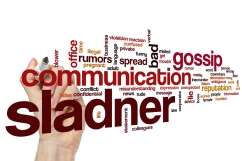Sept. 18, 2017
September is ethics months, and as with most of you, I feel a bit overwhelmed by the ethical problems we are seeing all around us. I wasn’t sure where to begin with an article about our ethical challenges and responsibilities as public relations professionals. Talking about the small challenges we face each day – Should I fudge on my time sheet to look better? Should I score points with the client by saying yes, I can pretty well guarantee this social media campaign will work? – seemed a little like rehashing old territory. We’re people who have signed onto our PRSA Code of Ethics. We’re supposed to know this stuff.
But what happens when you become aware of wrongdoing in your own organization or in a client’s organization? Should we blow the whistle, and if so, how and when? What will be the consequences to us personally?
Two good friends and colleagues, Dr. Cary Greenwood, APR, Fellow PRSA, and Mary Beth West, APR, Fellow PRSA, have written about what it is to be a whistleblower, and when to quit the battle. Greenwood conducted a study titled “Whistleblowing in the Fortune 1000: What practitioners told us about wrongdoing in corporations in a pilot study” which appeared in the Public Relations Review (Volume 41, Issue 4, November 2015, Pages 490-500). She found that just under half, about 44 percent, of the respondents knew about some kind of wrongdoing, and of those, about two-thirds had reported it. The greater majority, 81 percent, said that reporting wrongdoing was not part of their job. Nearly a third of those who reported and were identified suffered some form of retaliation.
West wrote on her blog, just this week, about her own experience as a whistleblower. In “What is your Whistleblower Threshold?” she described her experience in an unexpected role herself that she self-describes as investigative journalist and activist. I remember following her tale earlier in the year on her Facebook posts. She was, as always, clear and articulate, but had a seemingly intractable foe. She ended her post saying, “Survival mentality dictates that you cut your losses when you finally decide you’ve stopped caring – or the thing you cared so much about which prompted your whistleblowing is no longer worth caring about to the extent of the pain being inflicted by those who feel threatened by your challenges to their actions, over an organization that they – after all – largely control.”
Because her battle caused her enormous personal and professional pain, I can understand that last paragraph. There comes a time when you wonder if the battle is still worth it.
There are also some battles that go on for years. Since 2000, I’ve been involved in a whistleblowing effort as part of a protest against the military’s mandatory, experimental anthrax vaccine. I got involved when my son, then in the Air Force, was required to take the first three shots in the series, saying back then that they’d “just done that to the wrong mother’s son.” During the first few hours that I researched the vaccine online, I wasn’t alarmed. There were lots of reassurances that it was both safe and effective. Eventually, however, the truth began to surface. The Pentagon had asked the manufacturer of the vaccine which veterinarians use for cows and sheep – called the cutaneous or “of the skin” anthrax vaccine – to reconfigure it so that it could be used against aerosolized, or air-borne anthrax. The manufacturer did. The Pentagon used the new vaccine – without researching it, although in all fairness you can’t exactly spray people with anthrax and hope the vaccine works – and without testing or licensing it. It was experimental, and mandatory. To make matters worse, the manufacturer falsified the expiration dates on some lots of the vaccine; used vaccine that had become contaminated; and changed it once again without notifying the FDA.
I went to D.C. to hear testimonies before Congress from service members and veterans. With the help of the pilots leading the effort and many professionals lending their services pro bono, I formed a national group. I went back to D.C. twice to walk the halls of Congress, educating any staffer who would listen about the dangers of the anthrax vaccine. I wrote a “friend of the court” brief for a lawsuit. For a time, the vaccine was declared illegal. That lasted about two years. Then the FDA declared it to be legal, and that was that. These days, the number of shots has been reduced, the vaccine is supposedly safer, and I’m not aware of the same number of complaints. I’m mostly aware of people wanting to know how they can refuse the vaccine (if ordered to take it, they can’t.).
One of my fondest memories is from a radio interview I gave shortly after 9/11. If you’ll recall, there were post office workers in D.C. who received anthrax spores in the mail, and thanks partly to some members of our group, they had the sense to refuse the vaccine and insist on antibiotics instead (Cipro was the recommended drug at the time.). The radio station was somewhere in Ohio, and the announcer asked me if I wouldn’t want to take the vaccine if there were a threat of aerosolized anthrax. “No,” I said. “You can actually recover from anthrax, but you can’t recover from the effects of the anthrax vaccine.” First time I’ve ever heard “dead air” for about a full minute on the radio.
My son is long since out of the military, and is just fine. He’s a pilot now, flying cargo for a company in Utah. As for me, I run a website at http://mvrd.wordpress.com , which is being redone. I discovered I can’t emotionally handle talking every day to the veterans whose health has been severely compromised or even destroyed by the vaccine. I was constantly crying for their suffering and for their country’s betrayal (this also happened in Australia and Great Britain, just FYI). But because a lot of those men and women became good friends, and because I’ve watched these last 17 years as they’ve sometimes made progress, and sometime just endured, I keep the website going.
Three of the major things I’ve learned from my own activist years are these:
1. If you repeat something often enough and long enough, people really do believe it. No one checks the source documents anymore. The fight against half-truths, lies, alternative facts and fake news can never be dropped.
2. If something affects people personally, they will speak out and often take action. It was because of my son that I got involved. It was because of her own battle that Mary Beth West spoke out this week. It was because she had been a whistleblower and suffered retaliation herself that Cary Greenwood changed the course of her career and became a nationally renown researcher and instructor in the field.
3. Even if you don’t have a job at stake, which I didn’t, there can still be negative consequences to your activism. I had stepped out as a leader on the national stage concerning the anthrax issue, and as such was subjected to both intense criticism and conspiracy theories concerning my involvement – even from members of my own group. There was an incredibly painful transition when I stepped down. A lot of people who were furious that the group was disbanding had no interest in helping to run it or to contribute financially. Others were sure I had some evil intent, and spread lies all over the internet. The pain lingered for some time. Still, years later when the FDA (or someone) floated a proposal to test the anthrax vaccine on civilian children, there was a tremendous outcry and the attempt was shut down. I like to think we had something to do with that.
It is tempting and easy to turn a blind eye and say, “whistleblowing isn’t part of my job.” I’m sorry, but it is. If we are to be leaders in our profession — and I would submit that every single member of PRSA is a leader precisely because of our Code of Ethics — then we must speak out about ethics, and speak out constantly, all the time. A fear of retaliation is a genuine fear: we can’t afford to lose a job, to risk not supporting our family, to see our own reputations trashed. But sometimes we must take up the battle. If we turn a blind eye, we are part of the problem. Be authentic; be fair; be accurate; be transparent. And most of all, be ethical.
Read Full Post »
 It’s been difficult for the past three years. But now, with this “tit-for-tat” set of violent exchanges with Iran, we are so close to war – and to a possible nuclear war at that – that it seems nearly impososible to keep a positive attitude. Any my New Year’s resolution this year was to increase my gratitude.
It’s been difficult for the past three years. But now, with this “tit-for-tat” set of violent exchanges with Iran, we are so close to war – and to a possible nuclear war at that – that it seems nearly impososible to keep a positive attitude. Any my New Year’s resolution this year was to increase my gratitude.
 First Amendment rights and restrictions: Charlottesville, and the broader view
First Amendment rights and restrictions: Charlottesville, and the broader view There is a further burden of proof if a person is a public figure or a public official. A public official is someone who has been elected or appointed to office who has significant public responsibility and is engaged in policy making. A public figure is someone who has widespread notoriety or has injected himself or herself into a public controversy in an attempt to influence its outcome.
There is a further burden of proof if a person is a public figure or a public official. A public official is someone who has been elected or appointed to office who has significant public responsibility and is engaged in policy making. A public figure is someone who has widespread notoriety or has injected himself or herself into a public controversy in an attempt to influence its outcome. now the myriad complications to the press caused by social media, and the changes in communication brought on by so many cyberspace options.
now the myriad complications to the press caused by social media, and the changes in communication brought on by so many cyberspace options.
You must be logged in to post a comment.